The 300 Year Lineage of Japanese Language Education in Russia
Stella Artemievna Bykova (Head of the Japanese Philology Department, Institute of Asian and African Studies, Lomonosov Moscow State University)
The Japanese Philology Department at the Moscow State University Institute of Asian and African Studies has worked for the spread and development of Japanese language education for over 50 years and contributed as a bridge between Japan and Russia. As a result of these efforts, the Department received the Japan Foundation Awards for 2014. Below is the content of the lecture given by the Head of the Department, Stella Artemievna Bykova, entitled "Japanese Language Education and Study on Japanese Language and Literature at Moscow State University," in commemoration of receiving the award.
(From the lecture given at the Japan Foundation JFIC Hall "Sakura" on October 16, 2014.)
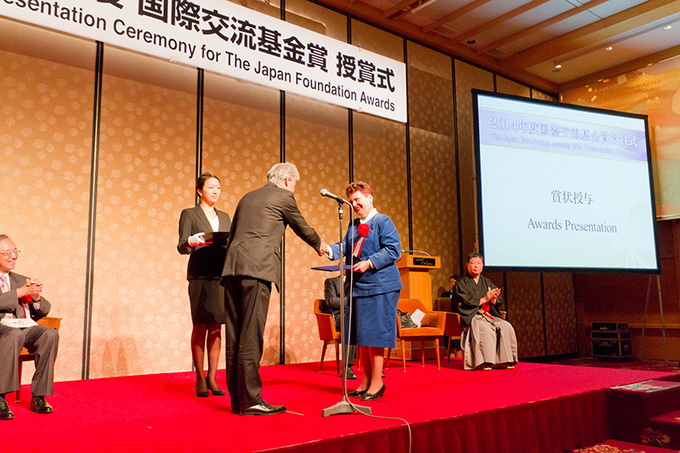

The 2014 Japan Foundation Awards Ceremony
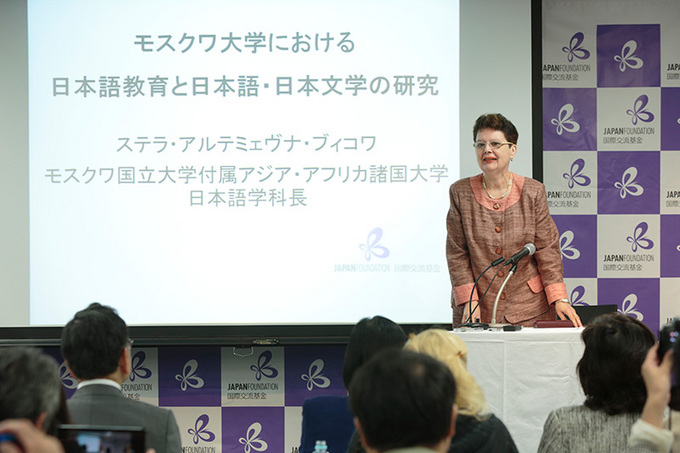
The 2014 Japan Foundation Awards Commemorative Lectures
The history of Japanese language education at Moscow State University
Japanese language education in Russia started in the beginning of the18th century in the year 1702. The countries of Russia and Japan are neighbors so long ago, Japanese ships had the perils of the sea, and the crews of those ships came to Russia. Dembei was the first person in history to start teaching the Japanese language in Russia. Dembei was shipwrecked off the shore of Kamchatka, and began teaching Japanese in 1702 under the orders of Peter the Great. In 1736, a Japanese language school was founded at the Russian Academy of Sciences, and a Japanese person named Gonza began to teach there. The first Japanese language textbooks and dictionaries were created at that time. Among those was the first Russian-Japanese dictionary in history that contained 12,000 words. A Japanese language school was opened in Irkutsk, Siberia, in the mid-18th century. At the time, the custom was for Japanese entering Russia to be baptized and take new names. Looking at textbooks and dictionaries created at the time, I believe that unique among them was the "Russian-Japanese Dictionary" created by Andrey Tatarinov, an instructor at the Japanese language school in Irkutsk. Andrey Tatarinov was the son of Sannosuke, a shipwreck survivor from the Tohoku region of Japan. His Japanese name was Sanbachi and he came from the Tohoku region, like his father. As a result, this dictionary, with 1,000 word entries, became the first dictionary of the Tohoku dialect in history. A Japanese language course was started at Saint Petersburg State University in 1870, and the foundation for Japanese language education steadily grew stronger. The Oriental Institute (now the Far Eastern Federal University) was founded in Vladivostok in 1899, and Japanese language teaching was begun there.
Since that time, through the 19th century up until the 1950s, Japanese language education continued, centered around Saint Petersburg. Japanese language education began in Moscow in the 1930s at the Moscow Institute of Oriental Studies, opened there at the time. After the war, Moscow became the center of Japanese language education and studies when professor N. Konrad, the famous scholar of Japan and China, and professor N. Feldman, who proposed a theory of the Japanese language, both moved from Saint Petersburg to Moscow to begin studies on Japanese language, literature, and culture. While professor Konrad developed his linguistic theory of the Japanese language and studied the classics of Japanese literature, such as The Tales of Ise and The Tale of Genji, he began the first fragmentary translations of those works. In addition to being an excellent scholar of Japan and China, professor Konrad was also a wonderful person, and his students superimposed the image of Hikaru Genji on their teacher, calling him "Prince Genji" only half in jest. At first, the Japanese language was taught at Moscow State University in two departments, namely the Department of Philology and the Department of History.
In 1956, the Institute of Oriental Languages was founded under Moscow State University, and the name was later changed to the Institute of Asian and African Studies, the name it has today. Not only Japanese language education, but oriental studies in general were greatly stimulated, and multifaceted development became possible. The Institute of Oriental Languages became the center of oriental languages teaching in Russia. Today, Japanese is taught as a second language in the Moscow State University Faculties of Journalism, World Politics, Geography, and Psychology, but the main faculty for teaching Japanese is the Institute of Asian and African Studies. The Institute of Asian and African Studies has been designated as the primary educational organization for oriental languages and other studies by the Russian Ministry of Education and Science, and is assigned the responsibility to create the standard for oriental language studies used throughout Russia.
Returning to our discussion on the history of the Institute of Oriental Languages, at the time the University had just begun, departments were created one after the other to include, in addition to the Japanese language department, the Chinese language department, the Modern Indian languages department, the Persian language department, South East Asian languages, Mongolian, the Korean language department, and the African languages department. The Japanese Philology Department began in 1956, giving it one of the longest history among the departments at the Institute of Asian and African Studies. In addition to Japanese language education itself, studies have been carried out in the Japanese language department in the domains of Japanese linguistics, literature, and language teaching methods. It would not be overstating to say that the founders of the Japanese language department were all eminent scholars.
Until 1962, the Japanese language department was called the Far East Oriental Languages Department, under associate professor N.Payusov as the head of the department. Associate professor Payusov was the first in Russian history to create textbooks for literary languages, cursive script, and the Sorobun style of literary language. Associate professor A. Ryabkin taught Japanese while he translated A Certain Woman by Takeo Arishima, and works by Toson Shimazaki and Ryunosuke Akutagawa. Instructor L. Lobachev added Japanese language history to the teaching curriculum. At the time, the only instructor for whom Japanese was her native language was instructor Yasu Katayama, daughter of Sen Katayama, a founder of the Japan Communist Party. Instructor Katayama taught Japanese conversation, but was also active in many other areas. She worked with the other instructors to create the first textbook created by the Japanese language department, and worked to introduce the culture and customs of Japan. Instructor Katayama was gifted with many talents, and had danced classical ballet when she was younger.
Associate professor I. Yoffe (whose pen-name was Lvova), a famous translator and scholar of Japanese literature, translated Nigorie(Troubled Waters) by Ichiyo Higuchi, Kuroshio by Roka Tokutomi, and works by Saikaku Ihara, Monzaemon Chikamatsu, and Ryunosuke Akutagawa. In particular, her translation of The Tale of the Heike into Russian was outstanding, almost a masterpiece, and even the preface was an excellent text on Japanese history and literature. She graduated from Saint Petersburg State University. During her student years, she studied under professor Konrad, and she had a deep knowledge of Japanese literature and culture. She taught Japanese literature and trained many scholars of Japanese literature. Her activities and studies garnered very high praise, and for the first time in history, she was awarded the Order of the Rising Sun, a Japanese order.
Cooperation developed with the Academy of Sciences. Professor Konrad gave lectures for university students two or three times per year, and instructors and students gathered from numerous departments throughout the university, not only the Japanese language department, to listen closely to what he had to say. As soon as it was learned that professor Konrad would be giving a lecture, the university became bright and cheerful as if there were a festival going on.

The year 1962 marked the beginning of a new stage for the Japanese language department. The main principles and teaching methods of Moscow State University, that is to say the Institute of Asian and African Studies, were completely formed, and the name of the department changed to officially become the Japanese Philology Department. Then, again in 1962, professor I. Golovnin, an excellent Japanese language scholar, took over the department as the head of the Department. Professor Golovnin remained in the same position until 1991, and his tenure marked a glorious era that can be called "the era of Professor Golovnin." During this time, new methods for teaching the Japanese language were adopted, and new textbooks and teaching materials were created. Like professor Yoffe, professor Golovnin also studied under professor Konrad during post-graduate course. Professor Golovnin not only taught the Japanese language, but he also carried out countless research into Japanese linguistic theory. His contribution to Japanese grammatical theory was particularly great, and in addition to his many research papers, his publications, both Gendai Nihongo no Bunpo (Modern Japanese Grammar)and Genzai no Nihongo Sintakusu Nyumon (Introduction to Modern Japanese Syntax), are still highly praised today.
Further, professor Golovnin also trained young researchers, and almost half of the professors at the Japanese Philology Department, including myself, were his post-graduate students. In addition to students from Moscow State University, graduates from other universities also came to be taught by professor Golovnin in post-graduate course. Particularly, many of the staff of the Japanese language department at the Far Eastern Federal University in Vladivostok were post-graduate students of professor Golovnin. At the same time, he also translated works of Japanese literature by Ryunosuke Akutagawa, etc. The beginner's Japanese textbook edited by professor Golovnin and created by the instructors at the Japanese Philology Department was used in both the former Soviet Union and modern Russia, and is still popular and in use today. In the Russian world of Japanese language studies, this text is called by its nickname, "Professor Golovnin's text-book." At the time, a convention on Japanese language and literary studies throughout Russia was convened every year at the university at professor Golovnin's instigation and a collection of research papers was published. In 1993, professor Golovnin was awarded the Order of the Sacred Treasure, a Japanese order.
Professor V. Grivnin was a superb translator and scholar of Japanese literature. While studying Ryunosuke Akutagawa, he translated almost all of the writer's works, as well as those of Kenzaburo Oe, and Kobo Abe. Professor Grivnin also studied translation theory, and taught Japanese to Russian translation to the students. Professor Grivnin was awarded the Order of the Rising Sun in 1997.
Associate professor L. Strizhak taught Japanese conversation, as well as Japanese to Russian and Russian to Japanese interpreting, and wrote a textbook on Japanese to Russian and Russian to Japanese interpreting methodology together with one other instructor, V. Yanushevsky, who was born in Tokyo. In addition to being an excellent teacher associate professor Strizhak was likely one of the best simultaneous interpreters involved in doing simultaneous interpretation for summits, meetings, and negotiations by heads of state. Associate professor Strizhak also worked hard to develop Japanese-Russian exchange. At one end of his wide ranging activities, he began exchange with various Japanese universities. This led to Moscow State University concluding agreements with Waseda University, Tokai University, and Soka University in steps. Within the framework of the agreements, students studying Japanese were able to attend exchange programs at numerous universities, while Japanese university students studying Russian could do the same at Moscow State University. I believe that the role of associate professor professor Strizhak, who actively participated in the negotiations for these exchange agreements, was extremely important. The first exchange agreement was concluded between Moscow State University and Tokai University, and the first group of students from Moscow State University, led by associate professor Strizhak, visited Japan in the mid-1970s. Unlike later groups of students, this group consisted not of undergraduates, but of graduates, and the aim was to train simultaneous interpreters. There were those among them who, with time, came to become superb scholars or diplomats after gaining experience as simultaneous interpreters. Thus, from this time, a long lasting exchange began with Tokai University. In high praise of his multi-faceted activities, L.Strizhak was awarded the Order of the Rising Sun in 2005.
N. Karpovich, a classmate of professor Yoffe, published many textbooks, though she did not carry out studies in literature or the Japanese language. His textbooks written for students of the so-called "secondary higher education," which had just begun, was particularly popular. "Secondary higher education" was a short-term two year course for graduates of other universities who wished to study Japanese. The students who studied in the course were specialists in numerous fields, including the Aeroflot pilots who flew the Moscow-Tokyo passenger route opened at the time, and sailors on cargo ships deployed from the Far East. Associate professor Karpovich graduated from Saint Petersburg State University, and received instruction from professor Konrad while she was a student.
Also, A. Paskowski, a famous linguist, worked as an instructor at the Japanese Philology Department for several years, and taught Japanese professors Golovnin and Grivnin when he was younger. Professor Paskowski has carried out research in all areas of Japanese language studies, and has written many books and papers.
Today, the Japanese language education curriculum is popular not just in Moscow, but throughout Russia. One factor that gave this trend major stimulus was the advancement of Japanese language studies in Russia. From the 19th through the 21th centuries, research was carried out in numerous domains. These included Japanese accent theory (Professor Polivanov the pioneer of the field, studied Japanese dialects and lived in Japan for many years, carrying out deep research into not only Japanese accent theory, but the system of consonants and vowels as well), Japanese grammatical theory (research by professors Konrad, Feldman, Pletner, and Polivanov), and history of the Japanese language (professors Syromyatnikov and Popov). The founders of the Japanese language department, together with other scholars, worked hard for the development of Japanese language studies. They carried out research in the Japanese language and the teaching methods thereof, as well as Japanese literary theory, and made it possible to raise the level of Japanese language education higher.
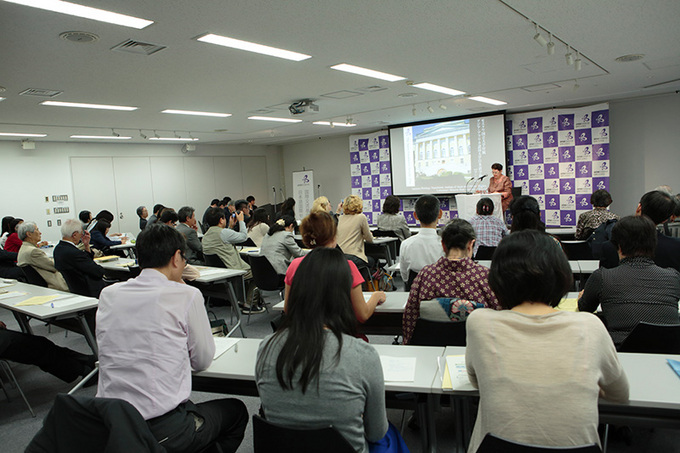
Japanese language education and research at the Japanese Philology Department today
Based on the theoretical foundations created by the founders of the department, today's Japanese Philology Department has adopted new methods for Japanese language education, and published many new Japanese textbooks and other learning materials.
The number of students learning Japanese is increasing every year. When the department was first established, there was one class per academic year with four or five students on average. The only three majors at the time were in Japanese language, Japanese literature, and Japanese history. Today there are four classes per academic year with over 140 students in the Japanese Philology Department. In addition to the original majors, choices today include the Japanese economy, political science and culture. The number of graduate students has also increased over previous numbers, and many youth who graduated from other universities come to enroll. Interest in Japan, the Japanese language, Japanese literature, and Japanese culture is spreading throughout Russia, and roughly 50 universities in the country, and countless schools, teach the Japanese language. If one looks at the numbers, one will see that the number of people who wish to learn Japanese is increasing every year. If one looks at the list of participants in the CIS university student Japanese speech contest that has continued for over 20 years, one can see that Japanese is being learned in almost all parts of Russia. The areas where Japanese education is being carried out are increasing. In addition to the areas such as Moscow, Saint Petersburg, and Vladivostok, where Japanese language education has long been carried out, it is now taught in Yekaterinburg at the foot of the Ural Mountains, Pyatigorsk in the North Caucasus, Nizhny Novgorod and Kazan along the Volga River, Ryazan near Moscow, and even many places in Siberia and the Far East.
Among the instructors, there are also those who attended post-graduate course at Moscow State University to obtain their Ph.Ds. In Moscow alone, whereas Japanese was previously only taught at Moscow State University and the Moscow State Institute of International Relations, it is now taught at universities such as the Moscow State Linguistic University, the Russian State University for the Humanities, the Oriental Countries University, the Moscow State Pedagogical University, and the Higher School of Economics. The majority of the Japanese instructors at these universities are graduates of the Japanese Philology Department at Moscow State University. There are also those among the instructors who went on to complete the Ph.D. course in the post-graduate course of the department. Children are also learning Japanese at the elementary, middle, and high schools where Japanese language education is being carried out. A "Japanese language festival," that is to say a Japanese speech contest, is held in the fall of every year for the children learning Japanese.
As mentioned before, the Institute of Asian and African Studies has been designated as the primary educational organization for oriental language and oriental studies by the Russian Ministry of Education and Science, and is assigned the responsibility to create the standard for oriental language education used throughout Russia. Let us review how the Japanese language education curriculum is prepared at Moscow State University in detail. First, I must explain the teaching materials, syllabus, and program. With regard to textbooks, both textbooks created in Russia, and those published in Japan are used. In addition to the new textbooks created by the instructors at the Japanese Philology Department, many new texts and videos have been received thanks to the help of the Japan Foundation and the Embassy of Japan to Russia over the last 10 to 15 years. These have been adopted in the teaching curriculum, which has made it possible to raise the level of Japanese language education. In addition to textbooks, instructors in the department are given the opportunity to train in Japan, which plays an extremely important role in the overall development of the Japanese language education curriculum. Further, specialists from Japan visit every year to actively participate, together with department instructors, in teaching Japanese.
Students at the Moscow State University Institute of Asian and African Studies primarily focus on the following majors, in addition to studying different oriental languages. The majors are linguistics, literature, history, political science, economics, and culture, and Japanese language and literature is taught by teachers from the Japanese Philology Department for all of them. Other departments are in charge of subjects such as Japanese history and economics. Students studying Japanese are divided into four classes, one for each major, with the culture and linguistics class, the history class, the economics class, and the political science class. Looking at each academic year, the average number of students of the Japanese language is 30 to 40 per year. The number of hours is 16 hours per week for first year students, 14 hours for second year students, 12 hours for third year students, and 10 hours for fourth year students. There is also a 10 to 12 month exchange program in Japan. Each class is taught by at least three teachers. At the introductory level, one teacher teaches grammar, the writing system and written expression, while two teachers are in charge of pronunciation and conversation. One of those teachers is sent from Japan. At the intermediate and advanced levels, there are sometimes four teachers. At those levels, Japanese to Russian and Russian to Japanese interpreting and translation is added, and there are separate teachers for each. While there are specific teaching methods for each of the introductory, intermediate, and advanced curriculums, elements they have in common are that students are made to read texts, translate, role play, converse, give speeches in Japanese, and auding, while working to acquire grammar, Kanji (Chinese characters), and speaking abilities. Students are also made to learn all of the officially designated common Kanji for daily use, and they write many papers and take tests. They are also made to interpret and translate Japanese to Russian and Russian to Japanese. There are two tests per year, each of which is composed of a written test and spoken test.
From the second year, all students at Moscow State University must write a thesis for the year, while fourth year students must submit a graduation thesis. The diverse themes of the thesis papers include issues of Japanese linguistic theory and sociolinguistics, and research on modern Japanese literature, poetry, and classical literature. As a rule, books written in Russian and English are generally used at the introductory stage where Japanese language skills are still inadequate, though some books written in Japanese are also used. Students at the intermediate and advanced stages, who have developed a foundation of Japanese language ability, use a wide range of books and papers written in Japanese for their studies. The studies of each student are directed individually by a specific teacher, and a presentation is given at the end of the academic year. This is the same as the graduate school. There are also special courses and seminars on theory for students majoring in Japanese language and literature in the Japanese Philology Department. These include Japanese literature from ancient to modern times, Japanese grammatical theory, lexicology, the history of the Japanese language, stylistics, Japanese to Russian translation theory, Japanese idiomatic theory, dialectical theory, and folklore, which are required subjects. Students majoring in history, economics, and political science attend lectures in Japanese literature given by instructors from the Japanese department, while students majoring in language and literature attend lectures given by instructors from the Japanese history and culture department, international economics related departments, and political science department. Based on these facts, it should be clear that the instructors at the Japanese Philology Department are engaged in a variety of research activities, including theoretical studies in numerous domains, in addition to the Japanese language.
Further, there is a teaching curriculum for the graduate school with deep courses in linguistic and literary theory given by the Japanese department. Two years ago, a new educational format was adopted at Moscow State University. This is the so-called "cross departmental course." The main purpose of this course is to allow students at Moscow State University to freely select courses and attend lectures from other departments in which they are interested so that they can become specialists ready for a wide array of domains, in addition to acquiring knowledge in their major. The Japanese Philology Department also participates in the program with associate professor Mazurik giving lectures on Japanese culture.
The instructors at the Japanese Philology Department believe that the students should acquire knowledge not only of the Japanese language, but of Japan, Japanese culture, and the traditions of the Japanese people as well. Activities outside of class are carried out as well. A speech contest is held in the department every year, and the first and second place winners go on to attend the Moscow university student Japanese speech contest. This speech contest is also held at the Institute of Asian and African Studies. Those who win first and second place then go on to participate in the CIS university student speech contest. Almost every year, students from the Japanese Philology Department become winners at the Moscow and CIS university student speech contests. It is a unique experience where students are able to interact with students from throughout Russia and the world as they select from a variety of themes (though most are related to Japan in some way) to give their speeches. Of course, they also participate in tests of Japanese language ability.
Also, in 1995, an Urasenke tea room was opened within the building of the Institute of Asian and African Studies. This tea room allows students to learn the Japanese tea ceremony through classes, and get a taste of Japanese culture. Lectures on Japanese culture are also held in the tea room. Incidentally, the first museum of oriental studies was opened in the Institute of Asian and African Studies in 2013, and Japan is represented among the exhibits. Students are able to listen to lectures on history from each department while viewing the exhibits.
The Japanese Philology Department is involved in three main activities today. The first is the educational curriculum discussed so far, and the second is the creation of new textbooks and teaching materials. The third area is carrying out research on Japanese linguistic theory, literature, and culture, a tradition begun by our former teachers.
With regard to textbooks, the Japanese Philology Department has created numerous textbooks for both University and elementary, middle, and high school use since the department was founded. The textbook in three volumes by the famous scholar professor Golovnin has of course long been available. Textbooks widely used today include the Shokyu Nihongo Kyokasho (Textbook on Introductory Japanese) by L.Nechaeva, Nichiro/Ronichi Tsuyakuho-Jokyuyo(Japanese to Russian and Russian to Japanese Interpreting Text-book - Advanced) by S.Bykova, and Chukyu Nihongo no Dokuhon(Intermediate Japanese Reader) by E.Strougova and N.Sheftelevich.
Research by instructors in the department mainly focuses on research in the areas of Japanese linguistic theory and literature. The research on Japanese linguistic theory is multi-faceted, and includes such areas as grammatical theory, lexicology, the study of Japanese literature, stylistics, translation theory, sociolinguistics, dialects, onomatopoeia and imitative word theory. Several years ago, for the first time in Russian history, Nichiro Kanyoku Jiten (Japanese Russian Dictionary of Idioms), by S.Bykova, and Nichiro Giseigo/Gitaigo Jiten (Japanese Russian Dictionary of Onomatopoeia and Imitative Words), written by N.Rumak, were published. The instructors of the department have written many papers which are published in the Journal of the Moscow State University: Far Eastern Studies Bulletin as well as other academic journals. There have also been collections of papers published by the department.
The research on Japanese literature covers a wide range, from classical to modern, and there has also been research on works of 20th century literature (the late associate professor Grishina), as well as research on Matsuo Basho (the late associate professor N.Sheftelevich). There is also research on folklore.
Every year in the springtime, the "Lomonosov Lectures" are held in each department at Moscow State University to celebrate the school's founder, the famous scientist Mikhail Lomonosov. During that time, working group meetings are held on the various areas of Far Eastern studies at the Institute of Asian and African Studies, and the instructors of the Japanese Philology Department actively participate. They also participate in other symposiums held by other universities and the Russian Academy of Sciences, and international conventions. This type of exchange allows instructors to deepen their own specialist knowledge and carry out higher level research, and this obviously improves the level of the Japanese language educational curriculum as well.
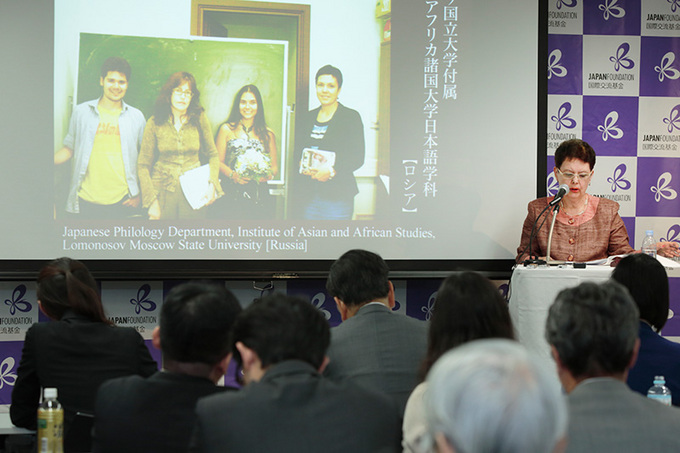
About our graduates
Since our founding, the Japanese Philology Department has sent forth roughly 2,000 graduates. These include not only Russian students, but students from Germany, China, Mongolia, Bulgaria, Hungary, Korea and Vietnam. There have also been graduate students on exchange from Japan. Among the graduates of the Japanese Philology Department, there are those who might even exemplify the saying that "the apprentice outstrips the master." Examples of these include scholars well known in Japan as well as Russia such as professors А.Meshcheryakov, L .Yermakova, and V. Molodyakov, professor D.Streltsov who is the head of Russia's society of Japanese scholars, the outstanding diplomats G.Kunadze, V.Dobrovolsky, and M.Galuzin who have served in such roles as Vice Minister for foreign affairs and ambassador, the famous translator and excellent writer G.Chkhartishvili (pen-name Boris Akunin), and professor T.Delyusina who translated the Tale of Genji.
The staff of the Japanese Philology Department are also almost all graduates of the department, and graduates of the department are also teaching Japanese at other universities. I take great pride in this, and I hope that graduates will be trained to carry on the traditions of the department in the future as well.
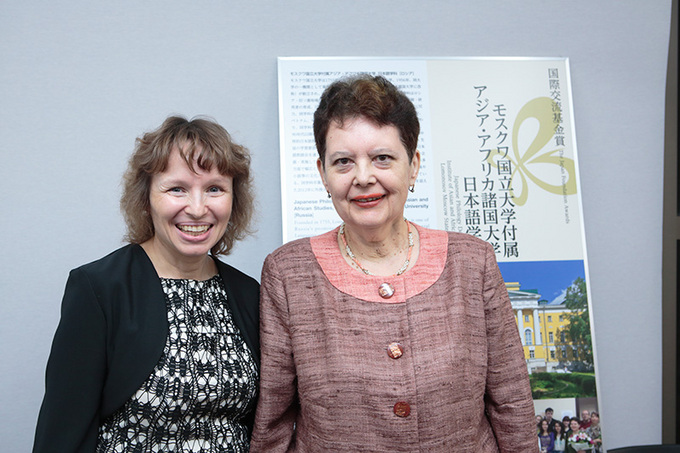
Stella Artemievna Bykova and a graduate (Latysheva Svetlana)(left) of the Moscow State University Institute of Asian and African Studies
(Photographs of the lecture by Atsuko Takagi)
●You may also enjoy reading (in Japanese):
Celebrating the 25th Anniversary of the Japanese-Language Institute, The Japan Foundation Awards (2014) Commemorative Lectures
"Japanese Language Education and Research on the Japanese Language and Literature at Moscow State University" (lecture report)
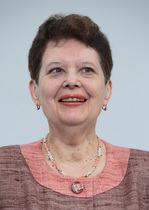 Stella Artemievna Bykova
Stella Artemievna Bykova
Head of the Japanese Philology Department at the Lomonosov Moscow State University Institute of Asian and African Studies.
Stella Artemievna Bykova started teaching at the Japanese Philology Department in 1967 after graduating from the Moscow State University. She obtained her Ph.D. in 1973. She became the head of the Japanese Philology Department in 2008, a position she still holds. Her areas of specialty are the Japanese language, Japanese linguistic theory, Japanese stylistics, Japanese idioms, dialects and lexicology. She has written over 90 books, textbooks, and papers on the Japanese language. Her Japanese to Russian translations include Roshia ni tsuite-Hoppo no Genkei (On Russia - the Original Northern Form) by Ryotaro Shiba. She is the chairman of the Moscow Association of Japanese Language Instructors. She is a member of the editorial board of the "Moscow State University Journal : Far Eastern Studies Bulletin."
Keywords
- Literature
- Translation
- Language
- History
- The Japan Foundation Prizes for Global Citizenship
- Japanese-Language Education
- Japan
- Russia
- Moscow State University Institute of Asian and African Studies
- Stella Artemievna Bykova
- Saint Petersburg State University
- Ise Monogatari
- Genji Monogatari
- Takeo Arishima
- Tōson Shimazaki
- Ryūnosuke Akutagawa
- Yasu Katayama
- Ichiyō Higuchi
- Ihara Saikaku
- Chikamatsu Monzaemon
- Kenjirō Tokutomi
- Heike Monogatari
- Far Eastern Federal University
- Kenzaburo Oe
- Kobo Abe
- Waseda University
- Tokai University
- Soka University
- Aeroflot
- Russian State University for the Humanities
- Oriental Countries University
- Moscow State Pedagogical University
- Higher School of Economics
- CIS
- All-Japan University Student Speech Contest
Back Issues
- 2022.11. 1 Inner Diversity<3> <…
- 2022.9. 5 Report on the India-…
- 2022.6.24 The 48th Japan Found…
- 2022.6. 7 Beyond Disasters - …
- 2021.3.10 Crossing Borders, En…
- 2020.7.17 A Millennium of Japa…
- 2020.3.23 A Historian Interpre…
- 2019.11.19 Dialogue Driven by S…
- 2019.10. 2 The mediators who bu…
- 2019.6.28 A Look Back at J…

